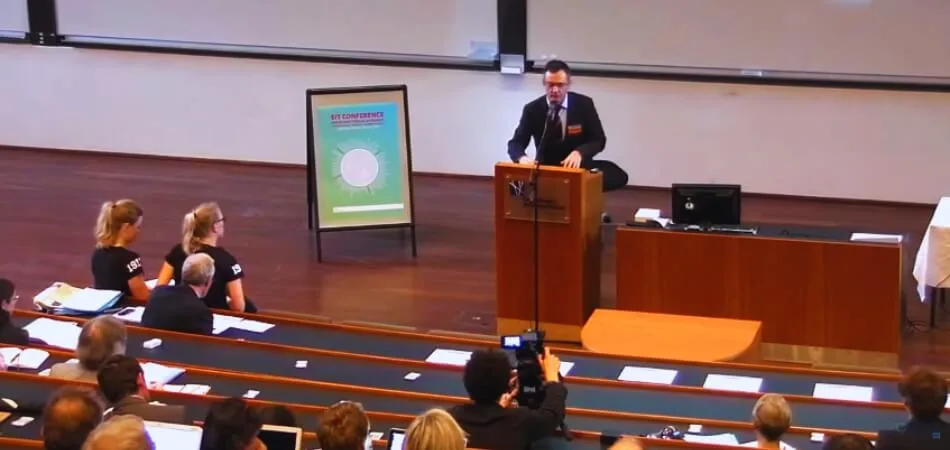Conferences are active events where minds meet and ideas flourish. They stand as a nexus for professionals from various fields, offering a unique blend of knowledge-sharing and networking opportunities. But why are conferences good for networking?
Conferences are excellent for networking because they bring together industry professionals and experts, facilitating connections, knowledge exchange, and collaboration opportunities.
They offer a platform for encountering potential mentors, partners, and employers, all while keeping attendees in sync with the latest industry trends. Dive deeper into our article to discover the multifaceted benefits of networking at conferences and how they can significantly enhance your professional journey.
A General Overview of a Conference
Conferences are meetings of knowledge and expertise, attracting individuals keen on learning and innovation. They act as a melting pot of ideas, where the latest trends and technologies are showcased and discussed. Here, attendees immerse themselves in a learning-rich environment, absorbing new concepts and perspectives.
Each conference is a unique experience, offering tailored workshops, presentations, and panel discussions. These sessions provide deep dives into specific industry challenges and advancements. The variety and depth of content available make them invaluable for personal and professional growth.
The impact of conferences extends beyond the event itself. They inspire attendees to think differently and apply new knowledge in their fields. This continuous cycle of learning and application drives industries forward, making conferences a crucial part of professional development.
What is Networking at a Conference?
Networking at a conference is about building valuable professional relationships. It involves interacting with peers, experts, and industry leaders in a structured environment. This process is vital for sharing knowledge, exploring opportunities, and fostering collaborative ventures.
At these events, attendees engage in conversations that extend beyond mere introductions. They exchange experiences, discuss industry trends, and share insights, often leading to mutually beneficial relationships. It’s an opportunity to connect with like-minded professionals and broaden one’s professional horizon.
Moreover, conference networking is not just about the immediate exchange of contact information. It’s a starting point for nurturing long-term professional relationships that can evolve into collaborations or mentorships. These connections often become crucial for career growth and development in one’s field.
Why Are Conferences Good for Networking?
Conferences are a goldmine for professional networking, offering unparalleled opportunities to connect with industry leaders and peers. They provide a unique setting where shared interests and expertise gather. This environment is ideal for fostering meaningful professional relationships and collaborations.
Diverse Attendee Profiles
Conferences attract a wide range of professionals, from industry veterans to emerging talents. This diversity offers a rich tapestry of perspectives and experiences for attendees to engage with. It’s a unique chance to meet individuals from various sectors and specializations.
Interacting with such a varied group broadens one’s understanding of the industry. It allows for the exchange of innovative ideas and practices that might not be accessible in one’s immediate network. These interactions can lead to new insights and approaches in one’s professional journey.
Structured Networking Opportunities
Conferences often include dedicated networking sessions, workshops, and social events. These are specifically designed to encourage interaction and connection among attendees. Such structured settings make it easier for individuals to approach and connect with others.
In these environments, conversations are more likely to lead to meaningful professional relationships. Attendees can identify potential mentors, collaborators, or business partners. These connections can play a pivotal role in career advancement and opportunity exploration.
Access to Industry Trends and Innovations
Conferences are hotbeds for the latest industry trends and innovations. They provide a platform for thought leaders to share their insights and for companies to showcase new products. This access to cutting-edge information is invaluable for professionals.
Being part of these discussions not only enhances one’s knowledge but also positions one as an informed and active industry player. Engaging in conversations about these trends and innovations can open doors to new business opportunities and collaborations. It positions professionals as forward-thinking and in tune with the industry’s pulse.
How Do You Build a Network at a Conference?
Building a network at a conference is an art that combines strategy, social skills, and a bit of courage. It’s about making meaningful connections that could lead to future opportunities and collaborations. The following steps provide a guide to effectively build your network at any conference.
Step 1: Set Clear Networking Goals
Before attending the conference, define what you want to achieve. This could be meeting potential employers, finding a mentor, or learning about new industry trends. Clear goals will guide your interactions and help you focus on relevant connections.
Step 2: Research Attendees and Speakers
Look up key attendees and speakers beforehand. Knowing their background and interests helps tailor your approach and conversation topics. This preparation makes interactions more engaging and meaningful.
Step 3: Prepare an Elevator Pitch
Craft a concise and compelling elevator pitch about yourself. It should include who you are, what you do, and what you’re looking for. This makes it easier to introduce yourself and make an impression.
Step 4: Engage Actively in Sessions
Participate in conference sessions and workshops. Asking questions and contributing to discussions can make you noticeable and approachable. It also shows your interest and expertise in the subject matter.
Step 5: Utilize Social Events
Make the most of social events and coffee breaks. These are less formal settings where people are more open to casual conversations. It’s an excellent opportunity to initiate connections in a relaxed atmosphere.
Step 6: Follow Up Promptly
After the conference, follow up with your new connections. Send a personalized message recalling your conversation and expressing your interest in keeping in touch. Prompt follow-up demonstrates your sincerity and commitment to the new relationship.
Step-7: Maintain the Connection
Keep in touch with your contacts over time. Share relevant articles, congratulate them on professional achievements, or suggest meeting up at future events. Regular communication nurtures the relationship and keeps you on their radar.
Common Challenges You Might Face While Networking at a Conference
Networking at conferences can be a highly rewarding experience, but it comes with its own set of challenges. Managing these obstacles is key to making the most out of your networking opportunities. Here are some common challenges you might encounter while trying to network at a conference.
- Overcoming Shyness: Initiating conversations with strangers can be intimidating, especially for introverts. This shyness can hinder the opportunity to make valuable connections.
- Finding Relevant Contacts: With so many attendees, identifying the right people to connect with can be overwhelming. It’s challenging to pinpoint who will be most beneficial to your network.
- Balancing Quantity with Quality: There’s a temptation to meet as many people as possible, often sacrificing the quality of interactions. This approach can lead to superficial connections that don’t yield long-term benefits.
- Standing Out in a Crowd: Making a memorable impression in a sea of professionals can be difficult. You need to find ways to distinguish yourself from others.
- Time Management: Effectively managing your time to attend sessions, network, and explore the conference can be a balancing act. Time constraints can limit the depth of your networking interactions.
- Follow-up Difficulties: Post-conference follow-ups are crucial, yet often overlooked due to busy schedules. Failing to reconnect can result in lost opportunities.
- Sustaining Connections: Maintaining and nurturing new relationships after the conference requires effort and consistency. It’s easy to lose contact amidst daily work pressures.
While networking at conferences can present various challenges, being prepared and adaptable can significantly enhance your experience.
Tips to Overcome These Challenges
Conference networking can seem challenging, but with the right approach, it becomes an enriching experience. Overcoming challenges is key to building meaningful connections and expanding your professional network. Here, we explore practical tips to manage common networking obstacles at conferences.
Tackling Shyness
To overcome shyness, start with small, manageable interactions. Engage in brief conversations during coffee breaks or in line for sessions. Practicing your introduction or talking points beforehand can boost your confidence. Remember, many others are likely feeling just as nervous as you.
Identifying Key Contacts
Prioritize quality over quantity in networking. Research attendees and speakers before the conference to identify those who align with your professional interests. Use social media platforms like LinkedIn to connect and schedule meet-ups in advance. This strategy ensures you target the most relevant contacts.
Balancing Interactions
Focus on meaningful interactions rather than trying to meet everyone. Quality conversations often lead to stronger, more beneficial connections. If a conversation is going well, don’t rush it; it’s better to have a few substantial interactions than many superficial ones. Always remember, genuine interest in others fosters more meaningful connections.
Making a Lasting Impression
To stand out, share unique insights or ask thoughtful questions during sessions. Personalize your approach by relating your experiences or expertise to the conversation. Wearing something distinctive or having an interesting business card can also help others remember you. Being authentic and memorable will make you stand out in a crowd.
Effective Time Management
Plan your conference schedule, balancing sessions with networking opportunities. Allocate specific times for networking, such as during breaks or social events. Don’t try to do everything; prioritize sessions and people that align with your goals. Remember, it’s about making the most of your time, not filling every moment.
Ensuring Follow-Up
Immediately after the conference, set aside time to follow up with new contacts. Personalize your follow-up messages by referencing specific conversations or shared interests. Scheduling these follow-ups in your calendar can ensure you don’t forget. Timely and personalized follow-ups are key to solidifying new connections.
Maintaining Relationships
To sustain connections, engage with your contacts regularly through social media or email. Share relevant articles, congratulate them on their achievements, or suggest a catch-up call or meeting. Consistency is key; periodic, meaningful interactions keep the relationship alive and growing. Remember, networking is a long-term investment, not a one-time event.
Conclusion
Experiencing the area of professional development, one quickly recognizes the significant role conferences play in networking. They are not just events, but platforms where ideas meet opportunity, fostering a rich environment for connections and growth.
This active setting answers the pivotal question of why are conferences good for networking by offering structured opportunities for meaningful interactions with a diverse range of attendees. These interactions lead to the formation of lasting professional relationships, fostering collaboration and mentorship opportunities.
Through these events, individuals gain not only new connections but also insights that are instrumental in shaping their careers. The networking potential at conferences is unparalleled, serving as a catalyst for professional development and opening doors to numerous opportunities.








